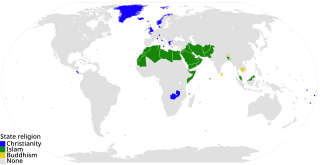
Politics of Malaysia takes place in the framework of a federal representative democratic constitutional monarchy, in which the Yang di-Pertuan Agong is head of state and the Prime Minister of Malaysia is the head of government. Executive power is exercised by the federal government and the 13 state governments. Federal legislative power is vested in the federal parliament and the 13 state assemblies. The judiciary is independent of the executive and the legislature, though the executive maintains a certain level of influence in the appointment of judges to the courts.

A commander-in-chief, also called supreme commander, is the person that exercises supreme command and control over an armed forces or a military branch. As a technical term, it refers to military competencies that reside in a country's executive leadership – a head of state or a head of government.

The Yang di-Pertuan Agong, also known as the Supreme Head or the King, is the constitutional monarch and head of state of Malaysia. The Yang di-Pertuan Agong is the commander-in-chief of the Malaysian Armed Forces. The office was established in 1957, when the Federation of Malaya gained independence from the United Kingdom. Malaysia is a constitutional monarchy with an elected monarch as head of state. The Yang di-Pertuan Agong is one of the few elected monarchs in the world.

The Prime Minister of Malaysia is the head of government and the highest political office in Malaysia. The prime minister leads the executive branch of the federal government. The Yang di-Pertuan Agong appoints a member of Parliament (MP) who, in his opinion, is most likely to command the confidence of a majority of MPs, the prime minister, usually the leader of the party winning the most seats in a general election. On 24 February 2020, Prime Minister Mahathir Mohamad resigned. The Yang di-Pertuan Agong reappointed him to hold the position in interim until a new prime minister is appointed.

The Federal Constitution of Malaysia, which came into force in 1957, is the supreme law of Malaysia. The Federation was initially called the Federation of Malaya and it adopted its present name, Malaysia, when the States of Sabah, Sarawak and Singapore became part of the Federation. The Constitution establishes the Federation as a constitutional monarchy having the Yang di-Pertuan Agong as the Head of State whose roles are largely ceremonial. It provides for the establishment and the organisation of three main branches of the government: the bicameral legislative branch called the Parliament, which consists of the House of Representatives and the Senate ; the executive branch led by the Prime Minister and his Cabinet Ministers; and the judicial branch headed by the Federal Court.

A secular state is an idea pertaining to secularity, whereby a state is or purports to be officially neutral in matters of religion, supporting neither religion nor irreligion. A secular state also claims to treat all its citizens equally regardless of religion, and claims to avoid preferential treatment for a citizen based on their religious beliefs, affiliation or lack of either over those with other profiles.

The Dewan Negara is the upper house of the Parliament of Malaysia, consisting of 70 senators of whom 26 are elected by the state legislative assemblies, with two senators for each state, while the other 44 are appointed by the Yang di-Pertuan Agong (King), including four who are appointed to represent the federal territories.
The Constitution of Iraq is the fundamental law of Iraq. The first constitution came into force in 1925. The current constitution was drafted and approved in 2005.

The civil service in Malaysia is pivotal around Article 132 of the Constitution of Malaysia which stipulates that the public services shall consist of the Federal and State General Public Service, the Joint Public Services, the Education Service, the Judiciary and the Legal Service and the Armed Forces.

The Election Commission of Malaysia, abbreviated SPR or EC, is a commission set up for the purpose of ensuring fair and equitable operations in undertaking the Malaysian General Elections. Its establishment is mandated by executive order of Malaysian Prime Minister Tun Dr Mahathir Mohammad. The Election Commission falls under the purview of the Prime Minister's Department.

The Constitution of Belgium dates back to 1831. Since then Belgium has been a parliamentary monarchy that applies the principles of ministerial responsibility for the government policy and the Trias Politica. The Constitution established Belgium as a centralised unitary state. However, since 1970, through successive state reforms, Belgium has gradually evolved into a federal state.

The Conference of Rulers in Malaysia is a council comprising the nine rulers of the Malay states, and the governors or Yang di-Pertua Negeri of the other four states. It was officially established by Article 38 of the Constitution of Malaysia, and is the only such institution in the world, according to the Malaysian National Library. Its main responsibility is the election of the Yang di-Pertuan Agong (King) and his deputy, the Timbalan Yang di-Pertuan Agong, which occurs every five years or when the positions fall vacant. Although its position in the process of elective monarchy is unique, the Conference of Rulers also plays a role in amending the Constitution of Malaysia and some other policies, in particular, those Articles which have been "entrenched", namely those pertaining to the status of the rulers, the special privileges of the indigenous Bumiputra, the status of the Malay language as the national language, and the clause governing the entrenchment of such Articles.
The Federal Public Service Commission (FPSC) is a federal agency of Government of Pakistan that is responsible for recruiting civil servants and bureaucrats for Government of Pakistan.

The judiciary of Somalia is defined by the Provisional Constitution of the Federal Republic of Somalia. It stipulates that the national court structure is to be organized into three tiers: the Constitutional Court, Federal Government level courts, and Federal Member State level courts. A future nine-member Judicial Service Commission is empowered to appoint any federal tier member of the judiciary. It also selects and presents potential Constitutional Court judges to the House of the People of the Federal Parliament for approval. If endorsed, the President then appoints the candidate as a judge of the Constitutional Court. The five-member Constitutional Court is likewise empowered to adjudicate issues pertaining to the constitution, in addition to various federal and sub-national matters.

The Government of Malaysia officially the Federal Government of Malaysia is based in the Federal Territory of Putrajaya with the exception of the legislative branch, which is based in the national capital of Kuala Lumpur. Malaysia is a federation of 13 states operating within a constitutional monarchy under the Westminster parliamentary system and is categorised as a representative democracy. The federal government of Malaysia adheres to and is created by the Federal Constitution of Malaysia, the supreme law of the land.

The chief justice of Malaysia, also known as the chief justice of the Federal Court, is the office and title of the head of the Malaysian judiciary system. The title has been in use since 1994, and prior to this it was known as the lord president of the Federal Court. The chief justice is the head of the Federal Court, the apex court of Malaysia. It is the highest position in Malaysian judicial system followed by the president of the Court of Appeal of Malaysia, chief judge of Malaya, and the chief judge of Sabah and Sarawak.
The federal government of Iraq is defined under the current Constitution, approved in 2005, as an Islamic, democratic, federal parliamentary republic. The federal government is composed of the executive, legislative, and judicial branches, as well as numerous independent commissions.

The Supreme Commander or Commander-in-Chief of the Malaysian Armed Forces is the highest-ranking office in the command structure of the Malaysian military. The office dates to the 1957 creation of the Malay federation. Its current role, duties and powers are regulated by the Constitution of Malaysia and the Federal Armed Forces Act.
The local government in Malaysia is the lowest tier of government in Malaysia administered under the states and federal territories which in turn are beneath the federal tier. Local governments are generally under the exclusive purview of the state governments as provided in the Constitution of Malaysia, except for local governments in the federal territories. The federal Ministry of Housing and Local Government plays a role in co-ordinating and standardising the practices of local governments across the country.
The state governments in Malaysia are the governments ruling the 13 states in the federation of Malaysia. All 13 states adopt the Westminster Parliamentary system and each has a unicameral state legislative assembly. The state government structure in all 13 states is similar to the government system of the federal government of Malaysia except for minor native judiciary powers in Sabah and Sarawak and that the state legislatures consist of only a single chamber.











